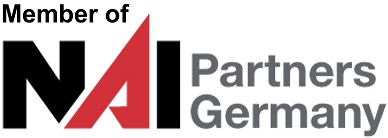In Q1 2023 the German residential portfolio transaction market falls to its lowest level since 2014
Frankfurt am Main, 5th April 2023 – At the start of 2023 the transaction market for residential portfolios in Germany produced a quarterly result that was significantly below average. The investment volume amounted to around €2.0 billion in the past three months, which represents the weakest result since the second quarter of 2014. It is also almost €1 billion lower than the result for the previous quarter and more than €2 billion below the year ago volume. A comparison of the first quarters of the past five or ten years provides an even starker contrast. The average for these periods is €6.2 billion and €5.6 billion respectively, or €4.2 billion and €3.6 billion above the latest result.
“In view of the changes in the business environment, market activity on the residential portfolio market is significantly more restrained compared to previous years. High inflation and rising interest and financing costs mean that buyers need prices to fall, but only very few sellers are willing to accept lower prices. This has brought about a slump in transaction activity,” said Dr Marcel Crommen, Managing Director of NAI apollo. In particular, Listed Property Companies and REITs are now showing greater investment restraint. These companies tended to dominate the market in previous years, acquired substantial holdings with high levels of debt and were responsible for large residential portfolio transactions.
“Against the background of high debt, rising interest rates and falling property stocks, the focus is now on securing and increasing equity. As a result, Listed Property Companies and REITs are also more active on the seller side and will continue to be so in the coming months. Accordingly, investors with strong equity capital, especially from Germany, are dominating current market activity. Further potential will be created from the continuing increase in rents, which improves the earnings perspective," said Stefan Mergen, Managing Partner of apollo valuation & research GmbH. The requirement for housing in Germany is already at a high level, and continues to rise. The new construction targets set by the federal government are far from being achieved. “At the same time, user demand for rental accommodation is growing. This is partly owing to the high influx of refugees but also to a rise in the number of former potential homebuyers who are finding house prices increasingly unaffordable in view of current interest rates and are now coming back to the rental markets,” added Dr Konrad Kanzler, Head of Research at NAI apollo.
Transaction volume fell in all segments except the segment below the €10 million mark
The number of transactions in Q1 2023 fell by 63 % compared to the previous year. A total of around 7,600 residential units changed hands in the past three months, a decrease of around 56 % compared to the same quarter of the previous year. As in Q1 last year, no major transactions above €500 million took place. In terms of the size of deals, transaction volumes fell by between 20 % and almost 90 % in all segments apart from the category below the €10 million mark, which registered the same volume as last year. “The ‘€100m - <€500m’ category still accounted for the largest market share. Here, a total of around €1.4 billion was invested, corresponding to 69.5 % of the transaction volume. In comparison, in the first quarter of 2022, this segment achieved a market share of 42.1 % with €1.7 billion,” said Kanzler.
Project development sales volume falls significantly
Construction activity and the transaction volume for project developments decreased in recent months as a result of high construction and financing costs. Transactions fell from €2.2 billion in the same quarter of the previous year to around €630 million. Compared to the average for the past five first quarters, this represents a decline of around 60 %. “High construction costs make it impossible for Project Developers and Contractors to make any significant price reductions, while buyers, in turn, have to factor in high financing costs. Buyers and sellers are therefore increasingly at odds over the price, which in turn has brought the market for project development sales to a virtual standstill. The latest result was underpinned by several deals that took place at the turn of the year. Without them, the slump would have been even more severe,” said Mergen.
Asset Managers & Funds Managers increase their purchase volume; Project Developers and Contractors are most active sellers despite significant declines
When differentiating by investor type, Asset Managers and Funds Managers represented the most active buyer group in the first three months of the year with €680 million or a market share of 34.5 %. This group also showed the strongest increase in market share compared to the previous year of 23.7 percentage points. The group comprising (equity-strong) Private Investors and Family Offices was also active on the buy-side and now occupies second place with a higher market share of 25.1 % and investments of just under €500 million.
"Despite the difficult market situation at present and a significant decrease in the absolute transaction volume by more than 75 %, Project Developers and Contractors still represent the most important players on the sell-side with a market share of 32.7 %. This is also because transactions that took longer to complete last year have now come to an end. Asset Managers and Funds Managers are next and almost achieved their previous year’s volume with more than €580 million,” said Kanzler. Listed Property Companies and REITs saw a five-fold increase in their absolute sales volume compared to the previous year and now rank fourth among the sellers with around €460 million.
German players continue to dominate the market despite halving their transaction volume
With regard to the origin of investors, domestic players again dominated the German residential portfolio transaction market in the first three months of 2023. In absolute terms, however, their transaction volume fell from €3.5 billion in Q1 2022 to €1.6 billion in the recent quarter. This corresponds to a market share of 80.7 %, which is 4.1 percentage points lower than previously. Accordingly, the proportion of foreign investors rose to 19.3 %. Even here, however, the absolute volume fell significantly by 38.6 % to €380 million.
Market activity will remain at a low level in the coming months
Meanwhile, the residential portfolio market continues to be affected by the consequences of the war in Ukraine, including a flattening of economic development, inflation and a rapid rise in interest rates. “Transaction processes are prolonged and often aborted. In view of the high financing costs, which in all probability will continue to rise, potential buyers are demanding significant price reductions, which have so far only been accepted by a minority of sellers. The investor groups that have dominated in previous years, Listed Property Companies and REITs above all, have largely put their acquisition efforts on hold and are focusing on consolidation, which will result in larger portfolios being brought onto the market. Market uncertainty will remain at a high level in the coming months and will be exacerbated by new societal debates and political requirements with regard to sustainability and energy efficiency,” said Crommen. At the same time, the good economic data continues to support the case for investments in the German housing market. There is an increasingly widening imbalance between supply and demand owing to population growth coupled with a simultaneous decrease in new building activity. “In addition to the coveted core segment, it is evident that demand has also increased in the value-add segment in recent months. Although the risk is higher, there is greater potential for value growth with corresponding manage-to-ESG strategies and thus more attractive opportunities for greater returns compared to transactions in the core segment,” Crommen added. The project development business, which has been so important in recent years, has suffered significant losses and will continue to decline since it is barely possible to finance new projects or find buyers at the current prices. The challenges will be no less daunting in the months ahead, and it remains virtually impossible to forecast market developments in the short term. “We can expect to see an end to the price negotiation phase between buyers and sellers under the premise that inflation and interest rates will stabilise in the coming months. We continue to assume that market activity will pick up in the second half of the year, with a further shift towards the end of the year becoming increasingly likely,” predicted Mergen.

